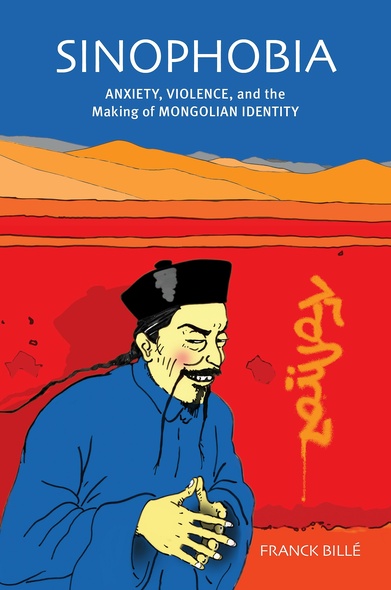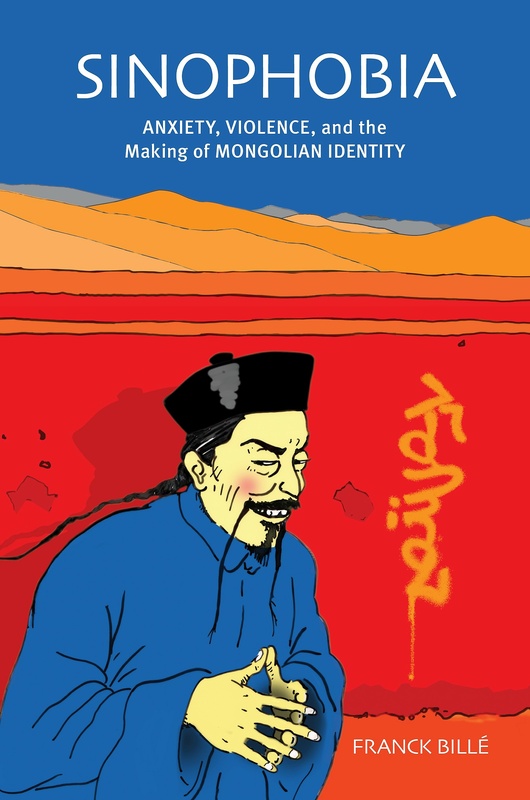
Sinophobia
Anxiety, Violence, and the Making of Mongolian Identity
Sinophobia is a timely and groundbreaking study of the anti-Chinese sentiments currently widespread in Mongolia. Graffiti calling for the removal of Chinese dot the urban landscape, songs about killing the Chinese are played in public spaces, and rumors concerning Chinese plans to take over the country and exterminate the Mongols are rife. Such violent anti-Chinese feelings are frequently explained as a consequence of China’s meteoric economic development, a cause of much anxiety for her immediate neighbors and particularly for Mongolia, a large but sparsely populated country that is rich in mineral resources. Other analysts point to deeply entrenched antagonisms and to centuries of hostility between the two groups, implying unbridgeable cultural differences.
Franck Billé challenges these reductive explanations. Drawing on extended fieldwork, interviews, and a wide range of sources in Mongolian, Chinese, and Russian, he argues that anti-Chinese sentiments are not a new phenomenon but go back to the late socialist period (1960–1990) when Mongolia’s political and cultural life was deeply intertwined with Russia’s. Through an in-depth analysis of media discourses, Billé shows how stereotypes of the Chinese emerged through an internalization of Russian ideas of Asia, and how they can easily extend to other Asian groups such as Koreans or Vietnamese. He argues that the anti-Chinese attitudes of Mongols reflect an essential desire to distance themselves from Asia overall and to reject their own Asianness. The spectral presence of China, imagined to be everywhere and potentially in everyone, thus produces a pervasive climate of mistrust, suspicion, and paranoia.
Through its detailed ethnography and innovative approach, Sinophobia makes a critical intervention in racial and ethnic studies by foregrounding Sinophobic narratives and by integrating psychoanalytical insights into its analysis. In addition to making a useful contribution to the study of Mongolia, it will be essential reading for anthropologists, sociologists, and historians interested in ethnicity, nationalism, and xenophobia.
Franck Billé brilliantly analyzes and explains the anti-Chinese sentiment in Mongolia. . . . Billé substantially analyses everyday and media anti-Chinese discourses that emphasize differences, rather than sameness derived from a shared Asian identity.
Franck Billé’s book makes a great contribution to the study of Sino-Mongolian relations, but more broadly also to racial and ethnic studies. It will please all anthropologists who grapple with the analysis of the production of embodied subjectivities and, in my opinion, it should be essential reading for every scientist interested in contemporary Mongolia and Asia.
The first thing that you notice about Franck Billé’s book is its striking cover. Against a bright red screen, topped by ochre hills and a blue Mongolian sky, stands a man dressed in unmistakably Chinese attire. His sneering visage and menacing posture convey nothing less than an intent that is wholly evil. The juxtaposition with ‘Sinophobia’ in the title requires no further elaboration. The author and the publishers are to be complimented first of all for their choice of designer and illustrator of this original and thought-provoking work.
Franck Billé’s Sinophobia provides nuanced insights into xenophobia from the vantage point of Mongolians and their relationship with their southern neighbours. It uncovers the history and current contradictions surrounding anti-Chinese sentiments commonly articulated by Mongolians in everyday speech and popular culture. . . . Sinophobia is a landmark anthropological study of a phenomenon in Mongolia that many have observed, but none have unpacked as carefully and critically as Franck Billé.
Dr Bille does highlight many of the Mongolian characterisations and stereotypes about the Chinese, which provides information of considerable value. . . . To his credit, Dr Bill´e has opened up interesting avenues of research and new questions for study.
This book sheds light on a poorly understood phenomenon in contemporary Mongolia and contributes to our understanding of how identities are formed through the imagination of a remote and yet omnipresent ‘other’. Making use of impressive linguistic skills and both discursive and ethnographic analysis, Billé examines both inter-ethnic and intra-ethnic dynamics to demonstrate how xenophobic discourses act to constitute the Mongolian nation. Scholars working on contemporary Mongolia can hardly afford to overlook this work, and it may also be of interest to students and scholars seeking to understand these issues from a comparative perspective.
Franck Bille’s Sinophobia should be considered as one of the best books for enabling people who live in English-speaking countries to understand the Mongols’ contemporary culture. . . . The book not only contributes to the understanding of Sinophobia in Mongolia, but also provides a solid footing for people to look at anti-Chinese sentiment in other regions, such as Turkey.
In his short coda, Billé adds that those Mongolians who actually travel and meet Chinese people tend to be less Sinophobic. This well-documented phenomenon supports his claim that Sinophobia is not an effect of real experiences of China or the Chinese but of exactly the lack thereof. It is what China stands for—backwardness, excess, rapaciousness, in a word Asianness—that scares Mongols, especially when they see it in themselves. . . . Sinophobia, then, is an interesting and thought-provoking analysis of the insistent production of national identity through othering, with wide applicability beyond Mongolia or even beyond ethnicity.
In Sinophobia: Anxiety, Violence, and the Making of Mongolian Identity, author Franck Billé explores the swell of anti-Chinese feeling that has accompanied Mongolia’s post-Soviet independence. . . . Billé has produced an engaging analysis of Chinese-Mongolian relations that will be of value to anyone with an interest in the connections between nationalism, identity and xenophobia.
Sinophobia is an interdisciplinary work combining anthropology, history, social psychology, linguistics, and cultural studies . . . Each of the seven chapters is filled with insights about the various representations of Sinophobia in Mongolia, which are often divorced from realities. . . . the anthropologist offers a useful analytical framework to examine the intersection of anxiety, anti-mainland Chinese sentiments, and identity crisis among Hong Kong people.
This is an authoritative ethnographic account that often moves with appealing insights into a fascinating people known more through myth and legend. . . . The book will be a welcome addition to the ethnic identity literature. In addition, it will appeal to readers interested in Mongolian culture, Chinese society, gender relations, and cultural change. In sum, this is a well-researched investigation chock full of neat references from wonderful thinkers. He uses psychological and sociological findings to good effect to supplement and support his interpretation. Further, he uses photos to a good effect to illustrate the author’s core thesis. Overall, this is an impressive achievement.
In going beyond the merely theoretical or rhetorical to consider this issue on the psychological level, Billé has produced an engaging analysis of Chinese Mongolian relations that will be of value to anyone with an interest in the connections between nationalism, identity and xenophobia. Its relevance will only grow as China’s expanding wealth and influence finds the presence of its citizens more deeply felt in neighboring countries such as Mongolia.
Billé (Univ. of Cambridge), an anthropologist specializing in Mongolia, has written a provocative study of anti-Chinese feelings and expressions in contemporary Mongolia, arguing that such feelings are not new but rose in the socialist period when Mongolia’s ties were closest to Russia and have been facilitated by a lack of knowledge about China.
This well-documented phenomenon supports his claim that Sinophobia is not an effect of real experiences of China or the Chinese but of exactly the lack thereof. Sinophobia... is an interesting and thought-provoking analysis of the insistent production of national identity through othering, with wide applicability beyond Mongolia or even beyond ethnicity
Franck Bille’s book makes a great contribution to the study of Sino-Mongolian relations, but more broadly also racial and ethnic studies. It will please all anthropologists who grapple with the analysis of the production of embodied subjectivities and, in my opinion, it should be essential reading for every scientist interested in contemporary Mongolia and Asia.
This powerful ethnography offers delicious insights into a fascinating people known largely through myth and legend. Bille’s argument, that present-day hostility of Mongols toward Chinese is more symbolic than pragmatic is intriguing, and his explanation that there are new forces promoting social closure among Mongolian peoples is revealing. The author brings to his task an impressive analytical perspective based on his mastery of Mongolian, Russian, and Chinese sources.
The greatest threat to the prosperity and well-being of our time is intolerance and hatred of others. We urgently need new insights into these processes and their historical development. Billé supplements ethnographic analysis with psychoanalytical insight to bring us a compelling, wide-ranging, and powerful account of the mechanisms of subjectivity and affect that inform and shape national identities and their frequently, and worryingly, violent reinscription.
Sinophobia is a compelling, lucid, and enormously insightful account of recent anti-Chinese sentiment in Mongolia, and its findings should resonate broadly across both Asian and Eurasian studies. Throughout, Billé combines careful ethnography and instructive analyses of affect, language, desire, and anxiety. The result is a truly novel synthesis, an important contribution to social and cultural theories of violence.
This is a fascinating book. It is bold, nuanced, and a great contribution to anthropology, Mongolian studies, and the interdisciplinary study of ethnic and national conflict.




